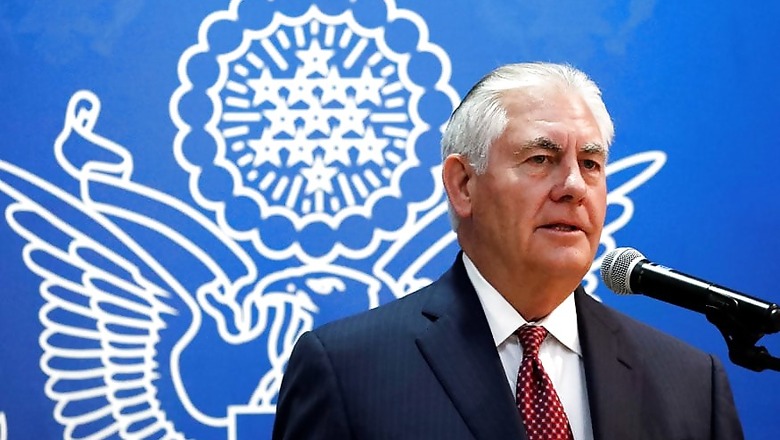
views
Islamabad/Washington: Ahead of his maiden visit to Pakistan, US Secretary of State Rex Tillerson on Monday indicated that he will firmly tell Islamabad to stop providing safe havens to terror groups on its soil to improve bilateral ties.
Tillerson's crucial visit to Islamabad on Tuesday, aimed at normalising bilateral ties, comes days after he made a major policy speech on America's growing strategic relations with India and US President Donald Trump's move to offer a bigger say for India in war-torn Afghanistan.
Islamabad needed to "take a clear-eyed view of the situation that they are confronted with in terms of the number of terrorist organisations that find safe haven inside" the country, Tillerson told reporters in Kabul where he paid a surprise visit.
"We want to work closely (with) Pakistan to create a more stable and secure Pakistan as well.
"We have made some very specific requests of Pakistan in order for them to take action to undermine the support that the Taliban receives and the other terrorist organisations receive in Pakistan," Tillerson told reporters travelling with him at the Bagaram Air Force base in Afghanistan.
According to transcripts of his media interaction provided by the State Department in Washington, Tillerson said the whole South Asia strategy of the Trump administration is conditions-based approach.
"So, our relationship with Pakistan will also be conditions-based. It will be based upon whether they take action that we feel is necessary to move the process forward of both creating the opportunity for reconciliation and peace in Afghanistan, but also ensuring a stable future Pakistan," he said.
"In our conversations with Pakistani leadership, we're as concerned about the future stability of Pakistan as we are in many respects here in Afghanistan," he said.
On the eve of his maiden visit here, Pakistani media reported that policymakers have put together an agenda for talks with Tillerson.
Tillerson is visiting Pakistan on the invitation of Foreign Minister Khawaja Muhammad Asif.
Earlier this month, Asif, who recently toured the US, said in a television interview that Pakistan has offered the United States a joint operation against terrorists on its soil. However, he later clarified that he never said Pakistan could allow foreign boots on ground.
Pakistani officials have prioritised the issues to be taken up with Tillerson which include the recent strain in Pak-US ties; US President Trump's new Afghan strategy; Pakistan's role in the Afghan peace process; and Pakistan's reservations on India's future role in Afghanistan, The Express Tribune quoted sources as saying.
The sources told the paper that Tillerson's visit is significant as it would clarify Trump's policy and set course for future Islamabad-Washington relations.
Tillerson last week said that the US expects Pakistan to take "decisive action" against terrorists and such a move will improve Islamabad's international standing as well as stability in the region.
"We expect Pakistan to take decisive action against terrorist groups based there that threaten its own people and the broader region," he said while speaking at the Center for Strategic and International Studies, a top US think-tank.
"It is the obligation, not choice, of every civilised nation to combat the scourge of terrorism. The United States and India are leading that regional effort together," he said.
By taking decisive actions against terrorists, Tillerson said, Pakistan furthers stability and peace for itself and its neighbours, and improves its own international standing.
Trump administration officials are frustrated by what they see as Pakistan's unwillingness to act against terror groups like the Haqqani network, which reportedly has close ties with the Pakistani military and its intelligence agencies.
Pakistan regularly denies that it hosts terror groups fighting the US and Afghan forces in Afghanistan.
In August, President Trump had unveiled his Afghanistan and South Asia policy in which he had hit out at Pakistan for providing safe havens to "agents of chaos" that kill Americans in Afghanistan and warned Islamabad that it has "much to lose" by harbouring terrorists.
Trump's criticism led to further strain in US-Pakistan relations with a peeved Islamabad saying the US president ignored its efforts in the war against terrorism.
Pakistan also asked the US to postpone a planned trip by its special representative for Afghanistan and Pakistan Alice Wells to Islamabad. Foriegn Minister Asif also delayed a visit to Washington for which he was invited by Secretary of State Tillerson.
But bilateral relations improved slightly after a meeting between Prime Minister Shahid Khaqan Abbasi and Vice President Mike Pence on the sidelines of the UN General Assembly last month.




















Comments
0 comment